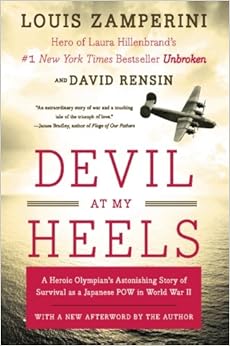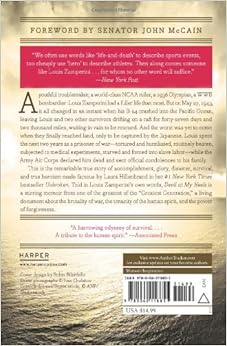From Library Journal
Zamperini was an intractable troublemaker of a youth who became a champion runner, competing in the 1936 Olympics and shaking hands with Hitler and Goebbels. When war seemed inevitable, he joined the Army Air Corps and flew a number of combat missions in the Pacific as a B-24 bombardier. In May 1943, his plane crashed on a routine search mission, and Zamperini and two survivors floated on a raft for 47 days before being taken prisoner by the Japanese. He spent the rest of the war in prison camps undergoing terrible abuse, as did many prisoners in Japan. After the war, disaffected and rootless, he attended an early Billy Graham revival and found religion. He became an inspirational speaker, eventually returned to Japan to confront and forgive his captors, and spent the rest of his life spreading Christianity and supporting various Christian endeavors. His memoir will fit well in inspirational collections, but it is also a well-written addition to the growing body of World War II personal narratives. Zamperini's positive attitude, resilience, and narrative strength make this a reasonable purchase for many public libraries and military collections. [During the 1998 Winter Olympics in Japan, Zamperini's story and dramatic return to face his torturer was chronicled on CBS's 48 Hours.-Ed.]-Edwin B. Burgess, U.S. Army Combined Arms Research Lib., Fort Leavenworth, K.
--Edwin B. Burgess, U.S. Army Combined Arms Research Lib., Fort Leavenworth, KS Copyright 2002 Reed Business Information, Inc.
--This text refers to an out of print or unavailable edition of this title.
Zamperini and Rensin devote three-quarters of the former's autobiography to his ups and downs before the influence of Billy Graham turned him around and he became a well-known inspirational speaker. A near delinquent in interwar Los Angeles, he nevertheless became a good enough runner to make the U.S. team for the 1936 Olympics. Later, serving in the Army Air Force in World War II, he survived six weeks adrift on a raft after his plane went down at sea and then, more than two years of particularly atrocious treatment as a prisoner of the Japanese. His postwar rehabilitation involved opportunities missed, money squandered, and sieges of alcoholism until Graham's counsel took hold (he also credits his wife, paying her generous tribute). His book not only retells the interesting life story of a generation now passing from the scene but also adds significantly to knowledge of each of the kinds of experience he underwent. It will find readers and please them.
Roland GreenCopyright © American Library Association. All rights reserved
--This text refers to an out of print or unavailable edition of this title.








